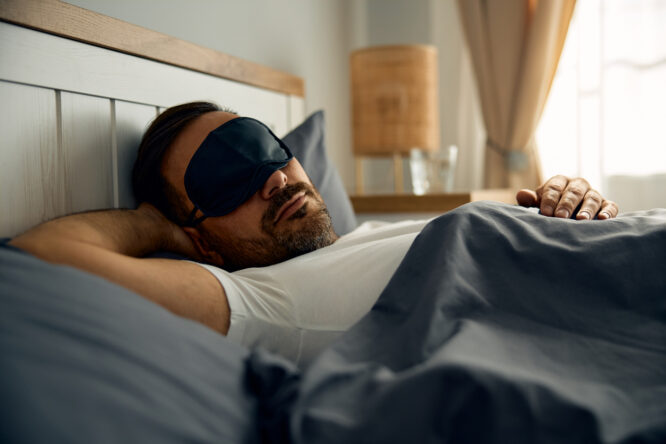People are always harping on about the importance of sleep, but it really is vital.

If you’re constantly waking up feeling groggy, even after what seemed like a full night’s sleep, it might not be about how long you’re sleeping, but how well. According to sleep experts, it’s often the little habits we don’t even think about that quietly mess with our sleep quality. From your morning routines to how you wind down at night, these everyday behaviours could be getting in the way of proper rest without you realising it.
1. Scrolling on your phone right before bed

We all do it—one last scroll through Instagram, a quick catch-up on messages, or a rabbit hole of TikToks to relax. The problem is that the blue light from screens tricks your brain into thinking it’s still daytime, making it harder to wind down. Sleep experts recommend putting your phone down at least 30 minutes before bed. Even better, leave it across the room and try a book or gentle music instead. Your brain needs a bit of separation between screen time and sleep time.
2. Drinking caffeine later than you think

Most people know not to have coffee right before bed—but what about that 3 p.m. latte? Caffeine can linger in your system for 6 to 8 hours, meaning even an afternoon pick-me-up can mess with your body’s natural wind-down process. If you’re sensitive to caffeine, cutting it off by early afternoon can make a real difference. And if you need something warm in the evening, try herbal tea instead of your usual brew.
3. Using alcohol to help you unwind

A glass of wine might make you feel sleepy, but it doesn’t help you sleep well. Alcohol messes with your sleep cycle, especially the deeper, more restorative stages. That’s why you often wake up at 3 a.m. after drinking, even if you were out cold at 10 p.m. Sleep specialists suggest limiting alcohol before bed if you want truly restful sleep. One or two nights off the booze can quickly show you the difference in your energy the next morning.
4. Eating too close to bedtime

A heavy dinner, or even just a late snack, can trigger digestion problems or mild reflux that interferes with your sleep without you noticing. That restless tossing-and-turning feeling? It could be your gut working overtime. Experts say it’s best to finish eating 2 to 3 hours before bed. If you’re genuinely hungry, stick to something light and low in sugar, like a banana or a handful of nuts.
5. Keeping an irregular sleep schedule

Going to bed at 10 one night and 2 a.m. the next confuses your internal clock. Your body loves routine—even if your social life or work doesn’t always allow for it. Constantly changing bedtime makes it harder to fall asleep and wake up refreshed. Try to stick to similar sleep and wake times, even on weekends. It doesn’t have to be exact, but consistency helps regulate your body’s rhythm so you start feeling tired when you’re supposed to.
6. Having too much light in your room

Streetlights, glowing chargers, or that tiny LED on your TV can all interrupt your melatonin production. Your brain’s sleep signals rely on darkness—any light can throw them off. Sleep experts recommend blackout curtains, unplugging unnecessary devices, and ditching night lights unless you really need them. Even covering a blinking router light with a bit of tape can make a surprising difference.
7. Napping too long or too late

A 20-minute power nap is great. A two-hour accidental nap at 6 p.m. is a one-way ticket to tossing and turning all night. Long or late naps mess with your sleep drive, leaving you wide awake when you want to be out cold. If you’re going to nap, try to keep it under 30 minutes and before 3 p.m. It’s enough to recharge without interfering with your ability to drift off later.
8. Not getting natural light in the morning

Spending all morning indoors or staring at a screen with the curtains drawn can confuse your circadian rhythm. Your body needs morning sunlight to lock in its day-night schedule properly. Even just 10 minutes of natural light first thing, outside or by a window, can help your brain know it’s time to be awake. It also helps set you up to feel naturally sleepy at night.
9. Overthinking your way into insomnia

Racing thoughts, to-do lists, spirals about that one thing you said in a meeting—your brain loves to bring it all up just as you’re trying to sleep. Plus, the more you try to force sleep, the harder it becomes. Experts suggest a wind-down routine that includes brain-emptying activities—journaling, breathing exercises, or even just writing down tomorrow’s tasks. Anything that gets the noise out of your head and onto paper can help your mind switch off.
10. Using your bed as a second living room

Watching Netflix, answering emails, scrolling endlessly—all from the comfort of your bed—teaches your brain to associate your sleep space with stimulation instead of rest. The more you reserve your bed only for sleep and sex, the quicker your brain learns that it’s time to switch off. That mental association plays a huge role in better sleep quality over time.
11. Keeping your room too warm

A toasty bedroom might feel cosy, but overheating at night leads to shallow, disrupted sleep. Your body needs to cool down slightly to transition into deep rest mode. Experts recommend keeping your bedroom between 16 and 19 degrees. Crack a window, use breathable sheets, and skip the thick duvet if you’re a naturally warm sleeper.
12. Ignoring signs of sleep disorders

If you wake up gasping, snore loudly, or feel exhausted, no matter how many hours you’re getting, there might be something deeper going on. Conditions like sleep apnoea are more common than you’d think, and often undiagnosed. Pay attention to patterns and speak to a doctor if things don’t improve. Sometimes better sleep isn’t just about habits—it’s about getting help for what’s silently interfering with your rest.




